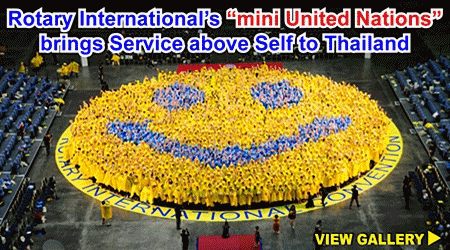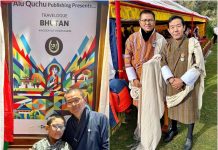Tata Young performs the National Anthem of Thailand at the opening plenary session during the RI Convention, May 6, in Bangkok. Thailand hosted over 35,000 Rotarians from across the world in what is sometimes described as a “mini United Nations” because of its internationality and multiculturalism.
Rotarians leave Thailand encouraged to fight poverty and finish the job of eradicating polio
The Rotary International Convention was held in Bangkok May 6-9, bringing more than 35,000 members from across the world to Thailand for its 103rd annual celebration. The Rotary convention is often described as “mini United Nations” because of its internationality and multiculturalism.
Her Royal Highness Princess Chulabhorn, representing His Majesty the King, graciously presided over the opening ceremony. In her address she thanked Rotarians for their good work around the world.
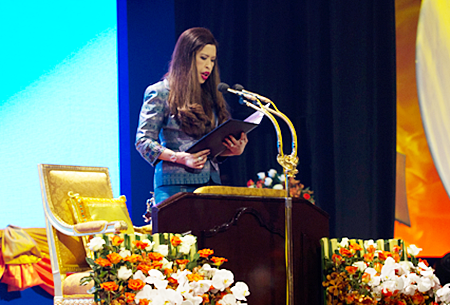 Her Royal Highness Princess Chulabhorn
Her Royal Highness Princess Chulabhorn
“Rotary International is well-known the world over as a public charitable organisation distinguished for its public service to humanity and for its tireless strive for public good. They include relief work for those who fall victim to natural disasters, campaigning for improvement in quality of life, as well as for the promotion of world peace.
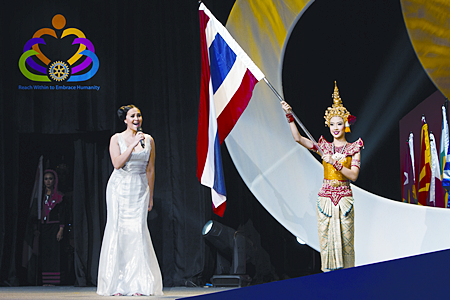 Tata Young performs the National Anthem of Thailand at the opening plenary session during the RI Convention, May 6, in Bangkok. Thailand hosted over 35,000 Rotarians from across the world in what is sometimes described as a “mini United Nations” because of its internationality and multiculturalism.
Tata Young performs the National Anthem of Thailand at the opening plenary session during the RI Convention, May 6, in Bangkok. Thailand hosted over 35,000 Rotarians from across the world in what is sometimes described as a “mini United Nations” because of its internationality and multiculturalism.
“I’m truly impressed by the unity of all Rotarians in devoting themselves to charity work in a spirit of selfless benevolence and dedication as befits Rotary’s own motto, Service Above Self,” said Princess Chulabhorn. “It is therefore a great pleasure to see members of Rotary International from all parts of the world, including their families, gathered here at the convention to reaffirm their faith and to remain steadfast in the ideals of Rotary, firm in their resolve ‘to do good in the world’. I am confident that your unwavering commitment and good intentions will reap due reward for our common cause.”
In his opening remarks, Rotary International President Kalyan Banerjee said Rotary is stronger today than it was at the beginning of his presidential term. “I came into this year determined to make a difference, to leave Rotary stronger at the end of my year. And those goals were met,” said Banerjee. “But if there is one thing I have learned in this incredible year, it is that the changes that I have seen, the lives that have been touched haven’t been because of me. They have been because of you.”
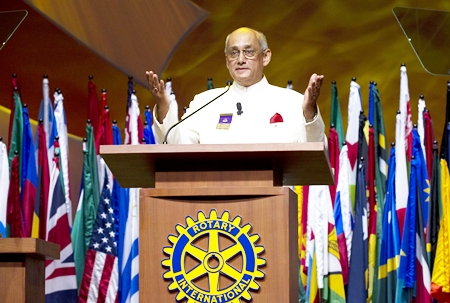 Rotary International President Kalyan Banerjee
Rotary International President Kalyan Banerjee
Banerjee praised the Rotary projects that he and his wife, Binota, saw during their travels throughout the year, sharing how overwhelmed with pride and joy he was for their great work.
This year, Banerjee visited projects from New York to the newest Rotary country, South Sudan, where Rotarians from several countries are working with the government to build a multimillion dollar hospital.
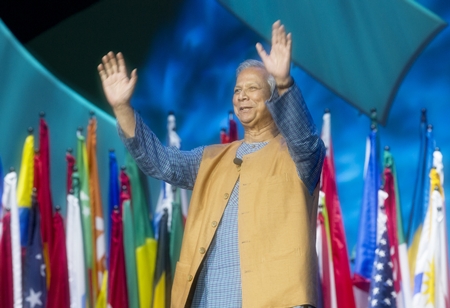 Muhammad Yunus
Muhammad Yunus
He also highlighted the recent project partnership agreement between RI and ShelterBox, a grassroots Rotary club-sponsored disaster relief organization.
“We Rotarians pride ourselves on being the first to arrive when help is needed – and the last to leave. By partnering with ShelterBox, we’ll be able to do even more,” said Banerjee. “I hope this will be only the first of many project partners, as we look to expand our reach with more volunteers, in more places than ever before.”
Speakers urge Rotarians to fight global poverty
Poverty and hunger were the targets of the plenary sessions of the 2012 RI Convention, as a variety of award-winning speakers encouraged Rotarians to use their ingenuity to solve these global challenges.
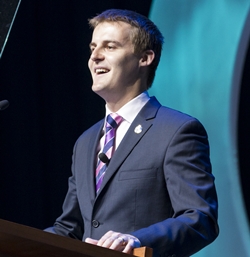 Hugh Evans
Hugh Evans
Microcredit pioneer Muhammad Yunus, a Nobel Peace Prize laureate, commended Rotarians for their work in developing microcredit loans for the poor. The founder of Grameen Bank also encouraged Rotarians to pursue social business enterprises that would work with microcredit-funded businesses not just to produce revenue but also to return profits to the communities where they operate.
As an example, Yunus highlighted a joint venture between Grameen Bank and Danone, a European food company, to produce high-nutrition yogurt for children in Bangladesh. The goal is to reduce malnutrition while creating manufacturing and distribution jobs.
“In today’s world, we use money to make money, not solve problems,” said Yunus. “If we use money creatively in a business framework, we can solve any problem.”
Recently, Grameen Bank also joined forces with Adidas to produce shoes that cost less than US$1 per pair. The affordable shoes help prevent infection by foot parasites in poor communities.
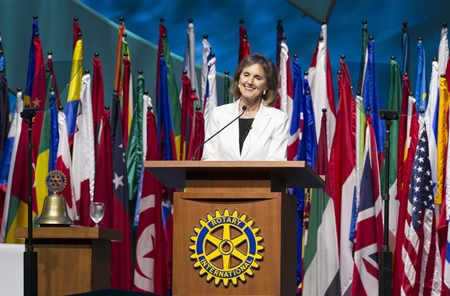 Gillian Sorensen
Gillian Sorensen
“My dream is to one day take poverty out of our society and put it in a museum that our grandchildren can visit to see what it was like,” Yunus said.
Antipoverty crusader Hugh Evans, cofounder and CEO of the Global Poverty Project, said Rotary can use its considerable influence to fight poverty.
“Like Rotary, we believe that mass mobilization of individuals can effect real change in the world,” Evans said. “When we focus on the needs of others, our own burdens become lighter. Our perspective sharpens.”
“This idea, the same one that drives you as Rotarians, guides our work at the Global Poverty Project,” he said.
UN connection
Gillian Sorensen, senior adviser and national advocate at the United Nations Foundation, encouraged Rotarians to work with governments to solve global problems including poverty, hunger, illiteracy, and lack of access to clean drinking water and sanitation.
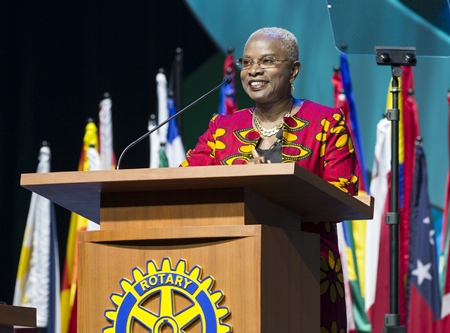 Angelique Kidjo
Angelique Kidjo
“What is clear is that problems like this are too great for governments alone to resolve,” said Sorensen, who has served in many positions at the UN including assistant secretary-general for external relations. “They need partners of every kind, from private sector to civil organizations like yours, who have the means to contribute and lead.”
Sorensen said Rotary, which has a 66-year relationship with the UN, continues to be an active and influential presence at the organization’s headquarters in New York. “You play a similar role with UNICEF, UNESCO, and WHO,” she adds.
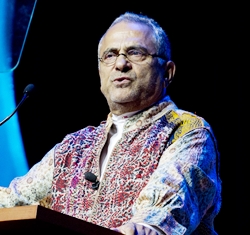 Jose Ramos-Horta
Jose Ramos-Horta
Angelique Kidjo, Grammy Award-winning singer-songwriter and activist, said the world has many health issues for which there are no solutions, but added that “the most frustrating are the ones for which we have a solution and not enough is being done.”
Kidjo, who was named a UNICEF Goodwill Ambassador in 2002, said Rotary’s “This Close” campaign is the right message to help eradicate polio for good.
“What I love about [the campaign] is that a simple goal is set,” she said. “We know eradication is possible. With your goodwill and energy, this goal is achievable.”
The four-day event, which drew to a close Wednesday, May 9, attracted more than 35,000 attendees from 181 countries and geographical areas and included a celebration of two major milestones in the global polio eradication effort.
Rotarians celebrate two major milestones in the organization’s decades-long fight to rid the world of polio
During the third plenary session Rotarians were congratulated for meeting and exceeding Rotary’s US$200 Million Challenge, Rotary’s response to $355 million in matching grants from the Bill & Melinda Gates Foundation for polio eradication efforts. Attendees also celebrated India’s removal from the polio-endemic list in February, which leaves only three countries where transmission of the virus has never been stopped.
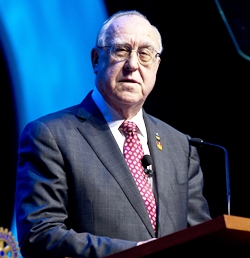 John F. Germ
John F. Germ
But speakers reminded the festive assembly that the work is far from complete, because the ultimate goal has not been reached.
“We know that we haven’t reached our goal. We haven’t ended polio,” said John F. Germ, chair of Rotary’s US$200 Million Challenge Committee. “Our clubs are still planning polio fundraisers for the coming years and encouraging donations from people in their communities.”
Germ announced that, as of 4 May, Rotarians and supporters have raised $215.7 million for the challenge, which runs through June. But with the Global Polio Eradication Initiative facing a significant funding shortfall for 2012 and beyond, it is vital for clubs and districts to keep pushing forward with their many creative fundraisers.
Public health emergency
Bruce Aylward, assistant director-general for polio, emergencies and country collaboration for the World Health Organization, said India’s removal from the polio-endemic list is “perhaps the most important milestone ever on the long road to eradication.”
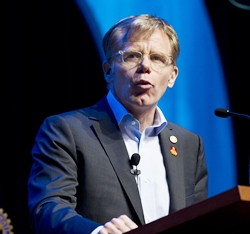 Bruce Aylward
Bruce Aylward
“It’s a magnificent achievement. And it is a Rotary achievement,” he said. “Today, Rotary’s vision of a polio-free world is much closer to reality.”
But an upsurge in cases of paralysis from polio in Nigeria, Pakistan, and Afghanistan and recent polio outbreaks in China, the Congo, and Tajikistan have also prompted what he called an “unprecedented push” to finally end the disease. He said 192 ministers of health will meet next week and declare polio a public health emergency.
“The world understands the full consequences of failure,” he said. “We must be faster, we must be more focused and each one of us must be fully accountable.”
Indian philanthropist Rajashree Birla, who has given more than $4.2 million to the Foundation for polio eradication, said she has been “overwhelmed with Rotary’s polio efforts.”
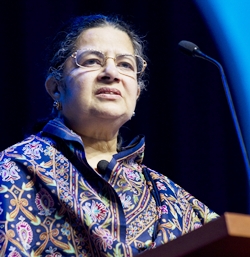 Rajashree Birla
Rajashree Birla
Birla’s late husband, Aditya, built the family business into one of India’s largest. Today, Birla and her son, Kumar Mangalam, head the Aditya Birla Group, a Fortune 500 company.
Birla stressed the need for business accountability and community service. Her Giving to Living campaign encourages corporations to “embed giving into their DNA.”
“When a corporation pushes its energies and helps resolve social sector issues through engagement, it indirectly stimulates its own business development,” said Birla. “There is much to be gained when business leaders take giving to heart, and set the mandate of making a difference by caring for people in their community.”
Service to Humanity award
Former Rotary Foundation Ambassadorial Scholar John Skerritt was presented with the 2011-12 Global Alumni Service to Humanity Award by Rotary Foundation Trustee Chair William B. Boyd.
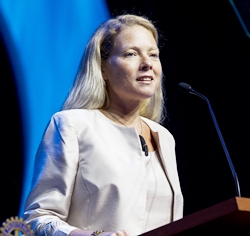 Amanda Martin
Amanda Martin
“Just as Rotary Fellowships help build international understanding, I had the privilege of leading a program of postgraduate training for over 300 agricultural scientists from 18 developing countries to assist in building the next generation of thinkers and leaders,” said Skerritt.
In his keynote address, Boyd noted the difference the Rotary Foundation makes in lives daily.
“When a group calling themselves Rotarians comes to a village and asks what are the most pressing needs that can be worked through together and the answer is water, you can understand the opportunity that this gives the woman who spends three hours each day walking with her teenage daughter to collect dirty water as that is the only supply available,” he said.
“A water supply to her village will give her time to grow food, will enable her daughter to be educated, her other children will not be constantly sick, and maybe she can get a microcredit loan and start a small business. What a difference that day will bring.”
Amanda Martin, an alumna of the Rotary Peace Center at Chulalongkorn University in Bangkok, thanked Rotary for the opportunity to broaden her skills. She said her work as a public health coordinator and teacher in a refugee camp on the border of Thailand and Myanmar is “inspiring and fulfilling.”
 President Elect Sakuji Tanaka
President Elect Sakuji Tanaka
“Rotary has already made a dramatic difference in my life and is having a profound ripple effect, radiating from me to my students and onto the impoverished populations that they will serve as public health workers,” said Martin.
In his closing remarks, RI President Kalyan Banerjee reminded Rotarians that “what’s important in Rotary isn’t what we say. It’s what we do, and who we are.”
“There dwells within you the power and spirit that can evoke the energy you may not realize,” Banerjee said. “You have to be hungry enough to reach within and release the energy to help you embrace humanity. I believe this is the state we call happiness. I have just given you the prescription for it. Rotary can help you achieve happiness in life that you seek.”
Peace through Service
Incoming RI President Sakuji Tanaka outlined his plans for his term, which begins 1 July. Tanaka will ask Rotarians to achieve Peace through Service.
“Through service we learn that the problems that may seem large to us are really very small,” said Tanaka. “We learn empathy for others. We come closer to people who seem very different from us. And we begin to understand how much we are all the same.”
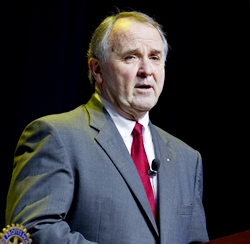 President Nominee Ron D. Burton
President Nominee Ron D. Burton
“Through our Rotary service, we know that cooperation is more productive than conflict,” he said. “We know that every one of us has something to give, and everyone has something to teach.”
Delegates elected nominee Ron D. Burton, of the Rotary Club of Norman, Oklahoma, USA, as the 2013-14 RI president during the fourth plenary session earlier in the day.
“I am both honored and humbled to accept the nomination of president of Rotary International,” Burton said in his acceptance remarks. “I take a tremendous amount of pride in being a Rotarian. To me, Rotary isn’t just another service organization. It is something different, something special.”
Burton says the best years are still to come for Rotary. He emphasized RI’s Strategic Plan as the tool to make that happen.
“The plan is a way to look clearly at who we are, where we are going, and how we should get there,” said Burton. “It’s a powerful reminder of our goals and priorities, which at their heart are the same as they’ve been since Rotary was founded.”
Achieving peace
Jose Ramos-Horta, president of the Democratic Republic of Timor-Leste, talked about his country’s struggle to achieve peace. He told Rotarians that peace can be difficult but, with the right people in place, it’s attainable.
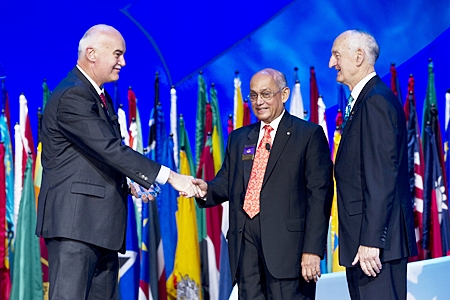 R.I. President Kalyan Banrjee congratulates John Skerritt (left) as he receives the 2011-12 Global Alumni Service to Humanity Award from Rotary Foundation Trustee Chair William B. Boyd.
R.I. President Kalyan Banrjee congratulates John Skerritt (left) as he receives the 2011-12 Global Alumni Service to Humanity Award from Rotary Foundation Trustee Chair William B. Boyd.
“Peace is a process – sometimes a long one, too long. It can be a formal political process,” said Ramos-Horta. “But to be sustained we have to deal with human beings as individuals, as communities, as people with traumas, emotions, and anger, but also with hopes, hearts, and feelings.”
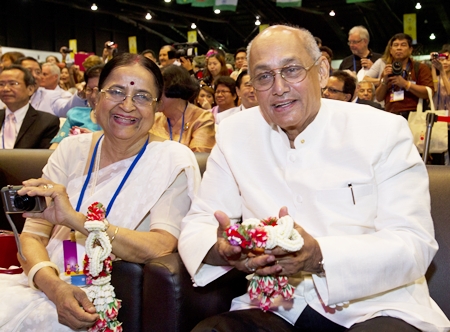 Binota and Kalyan Banerjee have a lot to smile about having dedicated most of their lives ‘Reaching Within to Serve Humanity’.
Binota and Kalyan Banerjee have a lot to smile about having dedicated most of their lives ‘Reaching Within to Serve Humanity’.


